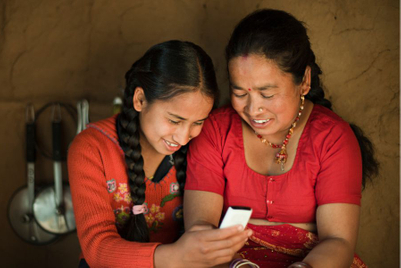
Background and aim
More than half (56 percent) of Nepal’s adult women are below 30 years old. But health research shows that only 12 percent of young married couples use contraception to delay the first birth, fewer than 32 percent adopt family planning to space out their their first and second children and fewer than 13 percent use birth control within two months after a child's birth.
As unplanned pregnancies take a toll on women's health and affect the life plans and dreams of young couples, Nepal's Ministry of Health sought to reposition family planning for the next generation and thereby increase its use among young married couples.
In 2015 the Ministry, the National Health Education Information Communication Center and the Family Health Division, with the support of the USAID Health Communication Capacity Collaborative (HC3) Nepal project, which is managed by Johns Hopkins University's Center for Communication Program (JHU-CCP), launched a campaign titled 'Parivar niyojan, smart banchha jeewan', or 'Family planning makes a smart life.'
Outreach Nepal provided the creative direction and media strategy for the campaign.
'Newly wed': In this TVC, a newly married couple has already opted for birth-control measures; they plan to have a child once they're more prepared to care for it.
Execution: Teachable moments
The campaign strategy and design was based on evidence gleaned from national data and original research, which showed, perhaps unsurprisingly, that young couples aspire to a brighter future for themselves and their families. The campaign aimed to show young couples that the pathway to fewer children is a pathway toward their aspirations.
The campaign was based on the key 'teachable moments', or life-stage events, when couples can make ‘smart’ family-planning decisions. These include their wedding, the birth of their first child and the time when they have their desired number of children. The campaign message: Family planning offers practical solutions at each of these stages, and couples should consult their health provider to choose from among the various methods available.
Outreach Nepal developed five television commercials in line with these themes. Corresponding radio commercials and billboard designs also portrayed the same storyline.
In a country where social messages have traditionally been delivered in PSA format, the campaign took a fully integrated communication approach, most likely for the first time in Nepal. Media planning covered all major national TV channels in news and entertainment content, pulsed over time. Because radio is the most effective medium to reach rural and semi-urban populations, the media plan also included placements in national radio, network radio, and regional FM stations. Outdoor advertising was placed along major national highways and in high-traffic locations in focal JHU-HC3 programme districts.

Top row left: “We are today’s smart couples”; Top row right: “With Family planning, initiate the start of a smart future”; Middle row left: "After your first child, take a smart decision, use appropriate birth control for family planning"; Middle row right: “We used family planning to have a birth gap between each child for a smart life and bright future”; Bottom row left: “Family planning is our smart decision to have a minimum 3 year gap after our first child”; Bottom row right: “Various methods are available for family planning. This smart couple have chosen the right method for them.”
The campaign received endorsements from celebrities and was taken to local markets with four large-scale events. These health fairs featured national sitcom artists, using an infotainment approach with skits portraying the different life stages and incorporating smart family planning. Nationally known musicians performed between the drama segments, drawing in young people and building excitement for the 'brand'. Over the course of four events, which were broadcast locally, crowd sizes grew from 5,000 to more than 30,000.
The programme also included community events, with face-to-face communication and dramas for young people, newlyweds, expectant mothers and new mothers. Systematic personal contacts were made among young, eligible couples at the grassroots level through household visits, through mothers’ group meetings, and through linkage with child-immunization days. Consistent monitoring and a careful plan of evaluating results were also built into the programme.
The campaign increased its reach significantly through social media, mainly YouTube and Facebook. A Facebook photo-upload contest was launched around Valentine’s Day 2016, leading to a lucky draw on April 12 (Nepali New Year’s eve). The social-media campaign was cross-promoted using the media, with strategic placement of articles in the national press, and promotion by announcers and celebrity appearances on TV weekly shows.
'Congratulations': A new grandmother (a key influencer), and a nurse advise parents of a newborn to start using family planning so they can devote proper care to their first child before they plan for a second.
Results
An independent survey by Sharecast Initiative Nepal in December 2015 showed that the nationwide campaign reached 58 percent of adults.
Social-media response was also strong, with reach of more than 5.6 million people (repeated). A video that HC3 posted on 26 November has reached 562,800 people, and another video posted on 10 November reached 297,800 people. The photo contest attracted about 2,500 successful uploads.
Most concretely, the campaign resulted in more than 81,000 eligible couples being contacted and more than 22,000 referrals for family-planning services through JHU-HC3 community programmes in 13 districts.
Anecdotally, many young couples now identify themselves as 'smart couples'. Through the campaign and its anthem, 'Hami haun ajaka smart dampati' (‘We are today’s smart couples’), family planning is on its way to becoming the ‘new normal’ for young couples in Nepal.
'Smart family': This spot advocates a three-year gap between children.


.jpg&h=334&w=500&q=100&v=20250320&c=1)


.png&h=334&w=500&q=100&v=20250320&c=1)


.png&h=334&w=500&q=100&v=20250320&c=1)







.jpg&h=268&w=401&q=100&v=20250320&c=1)
.png&h=268&w=401&q=100&v=20250320&c=1)

